New to the US – Here’s what you need to know about filing your taxes as an NRI in the US

- Green Card Test
- Substantial Presence Test

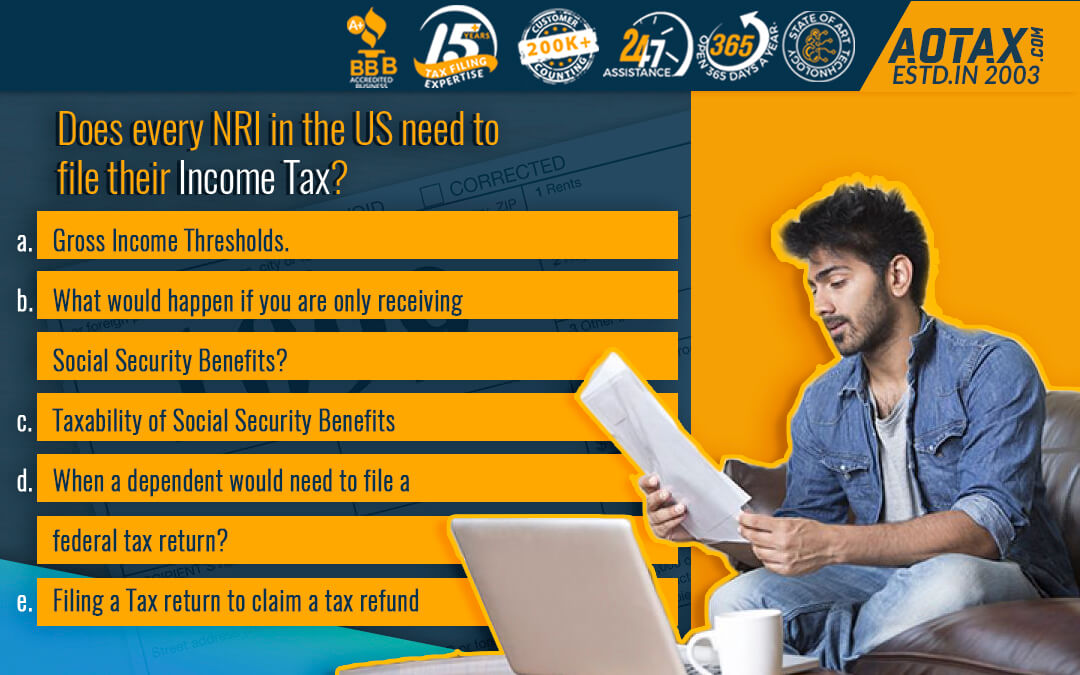

Planning for your taxes is very important and proper planning would help you in avoiding any further interest payment to the IRS due to missing tax deadlines.
With the annual fresh start which comes along with the New Year is approaching very rapidly, this is one of the best opportunities for the NRIs in the US to make certain resolutions. These resolutions can be related to finances and taxes as well. Tax Resolutions for a year can also be helpful in planning for the achievement of financial goals during a particular year.
If you are an NRI in the US, then it’s time for you to make your New Year Tax Resolution. Let us check out the major points which must be considered while making your New Year Tax Resolution for the year 2021.
Since you are a taxpayer in the country, you must gather the below-mentioned documents immediately before the tax season arrives.
You must be aware of these adjustments as they can help in the reduction of your taxable income. You must make these adjustments thus increasing your tax refund.
There are some tax credits or deductions which would be helpful in reducing the tax burden. If you have made a good tax plan then you must track this throughout the entire year.
If you are availing of the below-mentioned tax credits and deductions then you must have the related documents as well.
You can be able to claim the Recovery Rebate Credit if the below-mentioned criteria are met.
Before mid-February, the IRS will not issue any refunds if you are claiming the Earned Income Tax credit or Additional Child Tax Credit. The IRS has instructed the employer to hold the entire refund amount if a portion is not being associated with the EITC or ACTC. Most of the people would receive their EITC or ACTC related funds by the first week of March if there are no further issues related to the tax return.
So, as an NR in the US, you must be aware of these factors and make New Year resolutions that would be helpful in obtaining the tax returns conveniently.
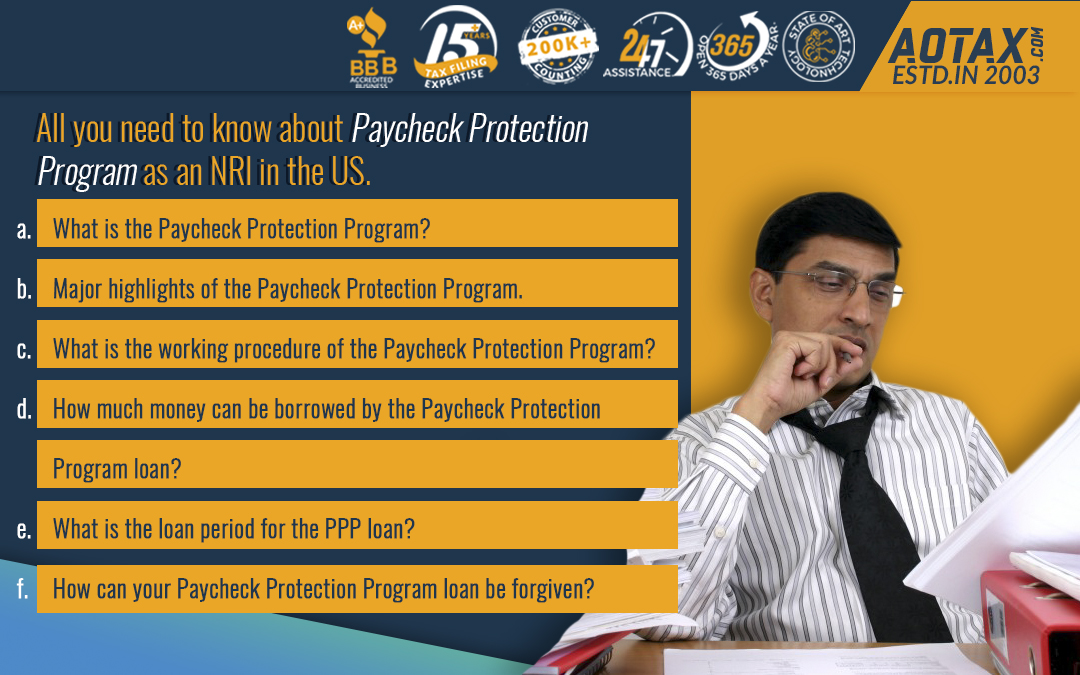
The Paycheck Protection Program is a type of loan which has been created for helping businesses in the maintenance of their workforces during these adverse pandemic times. All types of loans taken by the business would be forgiven by the US Small Business Association (SBA) if the major criteria of retention of employees are met and the funds are being utilized for those business expenses which are eligible.
The Paycheck Protection Program (PPP) was a program of $350 billion whose major intent is to provide the small businesses in America with cash flow assistance of 8 weeks through 100% federal loans. In late April 2020, the Paycheck Protection Program was expanded by an addition of $310 billion into the funding of this program. The deadline for applying for the Paycheck Protection Program has expired since 8th August 2020 but there can be an extension if there is another relief bill that is signed into law.
Small businesses that have around 500 employees or even fewer employees, other independent contractors, sole proprietors, or those NRIs who are self-employed are eligible for availing the benefits of the Paycheck Protection Program.
The Paycheck Protection Program loan would be completely forgiven if the fund from the loan would be utilized for interest on mortgages, payroll costs, utilities, and rent as well. There is no necessity for making the loan payment until the forgiveness application of the NRI has been processed or 10 months after the covered period of the loan ends.
The loan period is for 8 weeks from the date of loan origination. This is the actual date on which the NRI borrower would receive the loan amount in actual. The interest payments on the Paycheck Protection Program loan will be deferred by around six months. This loan is due in two years and no penalty is charged for pre-paying the charges. However, the loan period has been extended to around 24 weeks.
By loan forgiveness, the loan can be turned into a non-taxable grant. The entire loan or a part of the loan which would be received by small businesses under the Paycheck Protection Program can be forgiven if the owner would keep all the full-time employees on their payroll or if you are re-hiring your employees again within 24 weeks of receipt of the loan.
For the loan amount to be forgiven a minimum of 60% of your loan should be utilized in funding the business payroll and the employee benefit costs as well. Only 40% of the amount that has been forgiven could be used for the non-payroll expenses like the payments of mortgage interest, payments of rents, utilities, etc. Forgiveness will not occur until the end of the 24-week employment period occurs after the loan amount has been received. Businesses must ensure that they must keep proper records and have proper bookkeeping as proof of the business expenses that have been incurred during the loan tenure.
So, the Paycheck Protection Program would be of great help for those who have incurred losses in business due to the pandemic and these coronavirus relief plans are evolving at a constant pace.

Tax scams can lead to huge loss of money as well as personal information. The tax scammers usually make use of mails or telephones for creating scams that can involve individuals and businesses also. Tax scam alert for NRIs is a common occurrence in the US now. NRIs should always keep in mind that the IRS would not contact the taxpayers by mails, text messages, or through social media channels. IRS impersonators can also intimidate the common people by preparing fabricated bills for tax.
Tax scammers remain active throughout the year and the IRS urges the NRI taxpayers to be very careful about phishing emails and scams. The IRS would usually initiate contact with the taxpayers with the help of regular mail which can be delivered by the United States Postal Service. There would be special circumstances when the IRS would contact an individual or a business such as an overdue tax bill for the security of a delinquent tax return. Taxpayers would usually receive communication from the IRS in the form of notices or letters.
NRI taxpayers must keep in mind that the IRS would not do the following activities:-
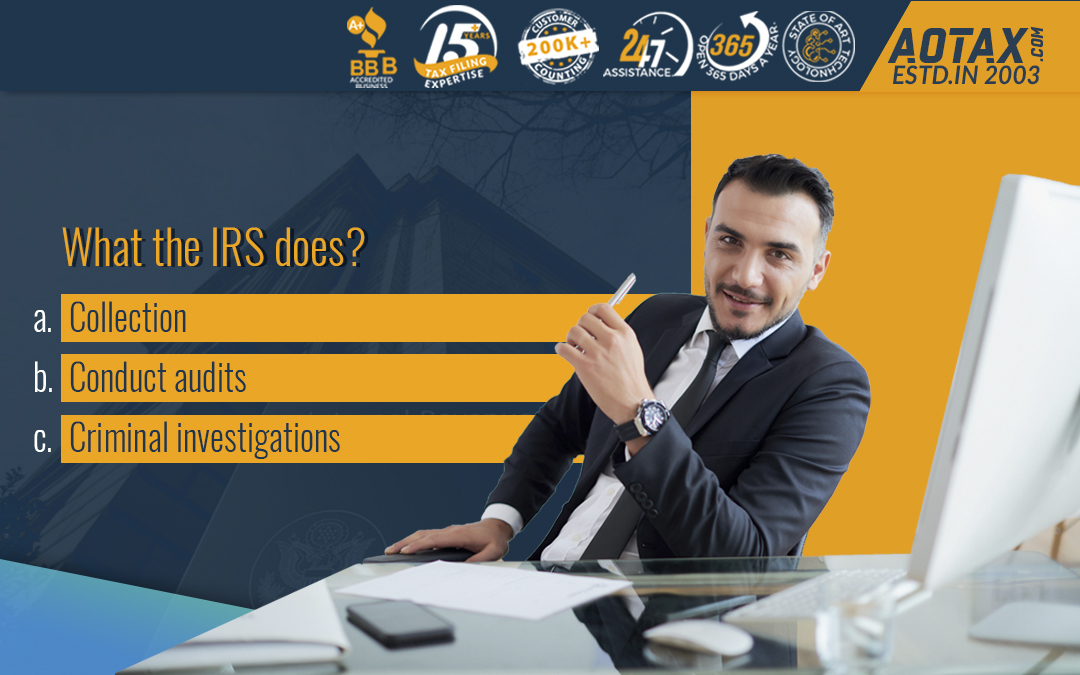
The IRS would resort to the below-mentioned methods to obtain the tax payments if any due for the NRI taxpayers.
The employees of IRS might come to your home or your workplace without any prior announcement for the collection of the tax due. However, the IRS employees will not make a demand for immediate payment of the taxes to any source other than the U.S. Treasury. The IRS would also assign private debt collectors for some of the taxpayers. The Private Collection Agencies would never ask the NRI taxpayers for payment through a gift card or a prepaid debit card.
The IRS can conduct audits and would also call NRI taxpayers for setting up appointments. The IRS can also call the taxpayers to discuss items related to the taxes. However, this would happen only when the IRS has attempted to provide notification to the taxpayers through mails. After the mailing, the IRS auditor would call the taxpayers for setting up discussion calls.
Criminal investigations can be carried out by the IRS for tax purposes and this can lead to investigators visiting the taxpayer’s house or business. But, these investigators are agents for law enforcement and would not be asking for any payment from the taxpayers.
If an NRI taxpayer suspects a tax scam or feels that he is being harassed by some impersonator, then he must take the below-mentioned actions.
So, with the number of tax scams and frauds increasing very speedily taxpayers must remain alert and inform about anything suspicious to the IRS.

Due to the pandemic COVID-19, millions of Americans are facing a very tough time maybe physically or financially. The rate of unemployment has been increasing at a very rapid rate with many Americans filing the claims for unemployment benefits. Moreover, the rate of unemployment has increased by 14% in the country due to a loss in work or due to many people being furloughed.
By the CARES Act, the US Government ensured that proper help was provided to those NRIs who have been impacted by the coronavirus. By the CARES Act, unemployment benefits and unemployment increase of $600 in a week was granted. However, if you are a furloughed NRI due to the COVID-19 and are obtaining unemployment benefits then it is quite obvious for you to think about the taxation rules for the unemployment benefit.
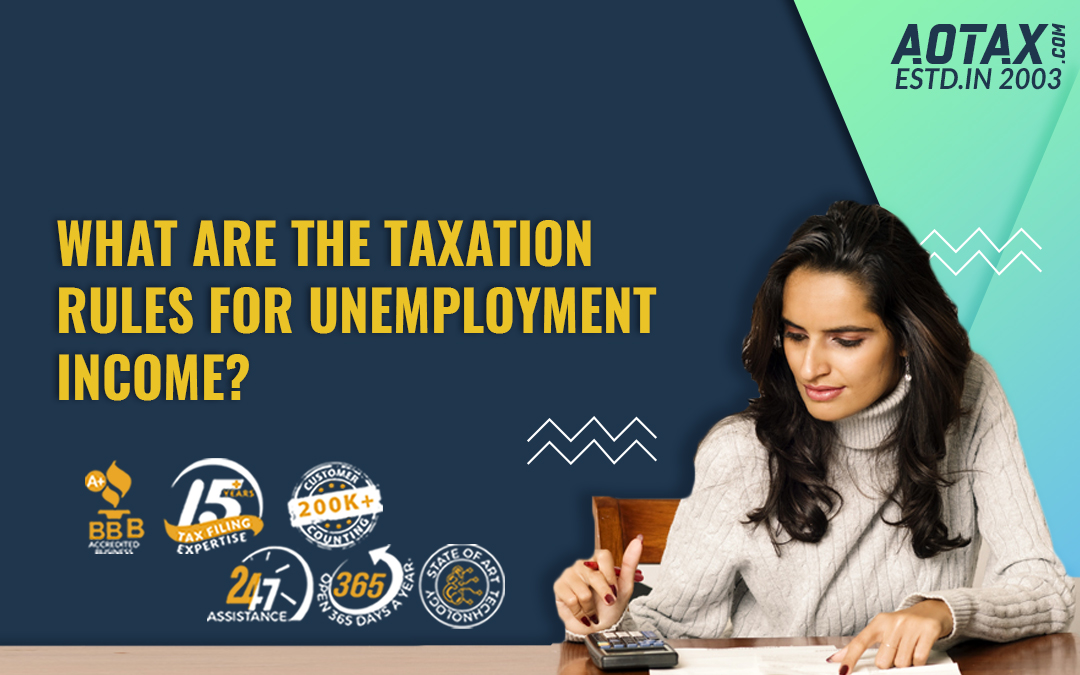
Unemployment benefit is considered taxable and it must be considered as a part of your income for the tax year. There are some states which would consider the unemployment income as taxable income.
When you are receiving unemployment income, you would be receiving Form 1099-G which would show the unemployment benefit that you have received.
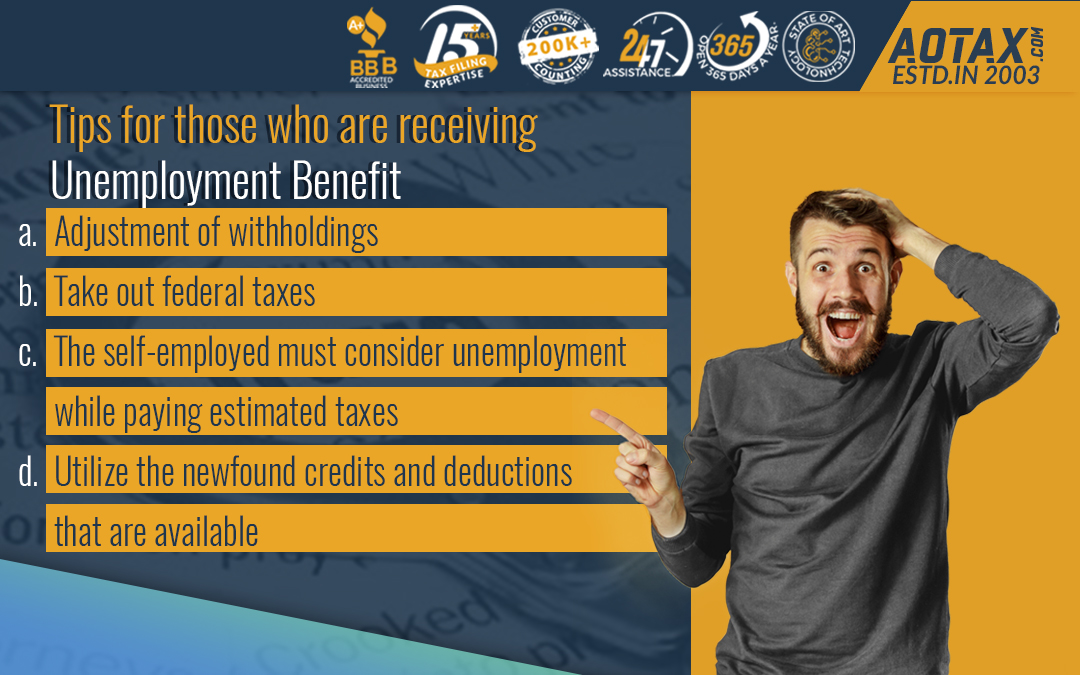
Some major tips for those NRIs who are receiving Unemployment Income are mentioned below.
If an NRI is employed, he must take his unemployment benefit into account while filling the W-4 withholding certificate for his employer. This is necessary if there have been no taxes withheld from the unemployment income of an NRI.
Unemployment income is taxable; an NRI must take out federal income from his unemployment income so that there are no problems while filing taxes. NRI taxpayers can withhold up to 10% from their unemployment income by filing Form W-4V Voluntary Withholding Request and providing it to the agency which would be paying the benefits. In case, the NRI does not choose voluntary withholding or does not withhold enough then he can even do estimated tax payments.
In case, the NRI is a freelancer, a contractor, etc. then the NRI must consider that the unemployment income would be added up to the self-employment net income and would be taxable. If the self-employed NRI plans to pay his estimated quarterly tax, then he can also consider his unemployment income if he does not have federal taxes withheld from his unemployment.
Utilize the newfound credits and deductions that are available
Some of the tax credits and deductions are based on the income of the NRI for which he might not have been eligible before because of higher income. However, the NRI is eligible for this now because of being furloughed. The best examples to explain this are the Earned Income Tax Credit and the Saver’s Credit. According to the IRS data, 20% of people do not remember these two credits. The Earned Income Tax Credit is calculated on the basis of income and is a big credit; in case the NRI has had a low income in the year 2020 due to the loss of wages then the NRI would be eligible for EITC. By this EITC, he would get a credit of worth over $6000 if the family has 3 kids.
By the Saver’s credit, contributions would be made towards retirement. In case, the NRI has paid towards his retirement plan in 2020 and is now under the income threshold by which he would qualify for Saver’s credit then he would obtain a credit whose worth would be up to $1000 in case of being single or $2000 if married and filing tax returns jointly.
The Child and Dependent Care Credit is another tax credit which an NRI might get to see if he had paid someone to take care of his child while he was working or even was job hunting, This percentage of child care credit would be from 20% to 35% of his expenses up to $3,000 if he has a single child and up to $6,000 if he has two or more children based on his income. In case the NRI is having a lower income he might claim 35% of his expenses i.e. $1,050 for a single child and $2,100 for more than two children.
So, these are some of the tax tips which would help furloughed NRIs to understand their tax implications without many complications.
Recent Comments